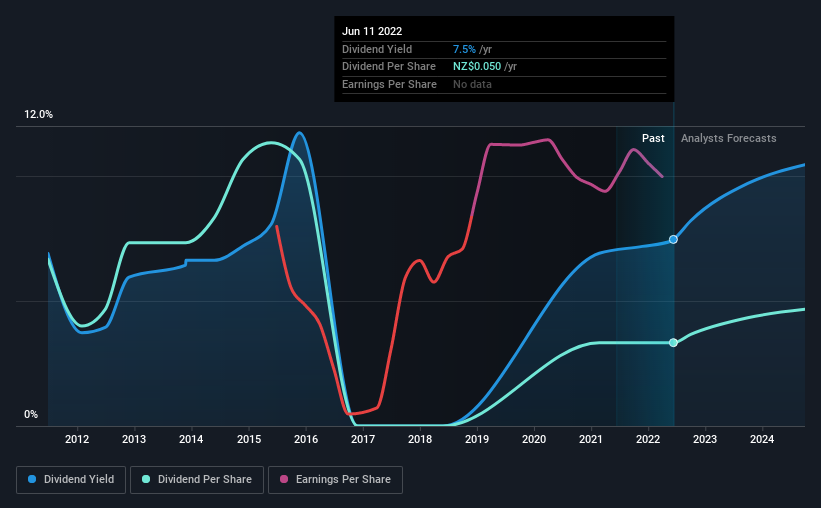Only Four Days Left To Cash In On Tower's (NZSE:TWR) Dividend
It looks like Tower Limited (NZSE:TWR) is about to go ex-dividend in the next four days. The ex-dividend date is usually set to be one business day before the record date which is the cut-off date on which you must be present on the company's books as a shareholder in order to receive the dividend. It is important to be aware of the ex-dividend date because any trade on the stock needs to have been settled on or before the record date. Accordingly, Tower investors that purchase the stock on or after the 15th of June will not receive the dividend, which will be paid on the 30th of June.
The company's upcoming dividend is NZ$0.025 a share, following on from the last 12 months, when the company distributed a total of NZ$0.05 per share to shareholders. Based on the last year's worth of payments, Tower stock has a trailing yield of around 7.5% on the current share price of NZ$0.67. Dividends are an important source of income to many shareholders, but the health of the business is crucial to maintaining those dividends. We need to see whether the dividend is covered by earnings and if it's growing.
Check out our latest analysis for Tower
Dividends are usually paid out of company profits, so if a company pays out more than it earned then its dividend is usually at greater risk of being cut. Tower distributed an unsustainably high 190% of its profit as dividends to shareholders last year. Without more sustainable payment behaviour, the dividend looks precarious.
When the dividend payout ratio is high, as it is in this case, the dividend is usually at greater risk of being cut in the future.
Click here to see the company's payout ratio, plus analyst estimates of its future dividends.
Have Earnings And Dividends Been Growing?
Stocks in companies that generate sustainable earnings growth often make the best dividend prospects, as it is easier to lift the dividend when earnings are rising. Investors love dividends, so if earnings fall and the dividend is reduced, expect a stock to be sold off heavily at the same time. That's why it's comforting to see Tower's earnings have been skyrocketing, up 58% per annum for the past five years.
Another key way to measure a company's dividend prospects is by measuring its historical rate of dividend growth. Tower has seen its dividend decline 6.7% per annum on average over the past 10 years, which is not great to see. Tower is a rare case where dividends have been decreasing at the same time as earnings per share have been improving. It's unusual to see, and could point to unstable conditions in the core business, or more rarely an intensified focus on reinvesting profits.
Final Takeaway
From a dividend perspective, should investors buy or avoid Tower? Tower has been generating credible earnings per share growth, although its dividend payments were not adequately covered by earnings. We're unconvinced on the company's merits, and think there might be better opportunities out there.
With that being said, if dividends aren't your biggest concern with Tower, you should know about the other risks facing this business. To help with this, we've discovered 1 warning sign for Tower that you should be aware of before investing in their shares.
If you're in the market for strong dividend payers, we recommend checking our selection of top dividend stocks.
Have feedback on this article? Concerned about the content? Get in touch with us directly. Alternatively, email editorial-team (at) simplywallst.com.
This article by Simply Wall St is general in nature. We provide commentary based on historical data and analyst forecasts only using an unbiased methodology and our articles are not intended to be financial advice. It does not constitute a recommendation to buy or sell any stock, and does not take account of your objectives, or your financial situation. We aim to bring you long-term focused analysis driven by fundamental data. Note that our analysis may not factor in the latest price-sensitive company announcements or qualitative material. Simply Wall St has no position in any stocks mentioned.

 Yahoo Finance
Yahoo Finance 
